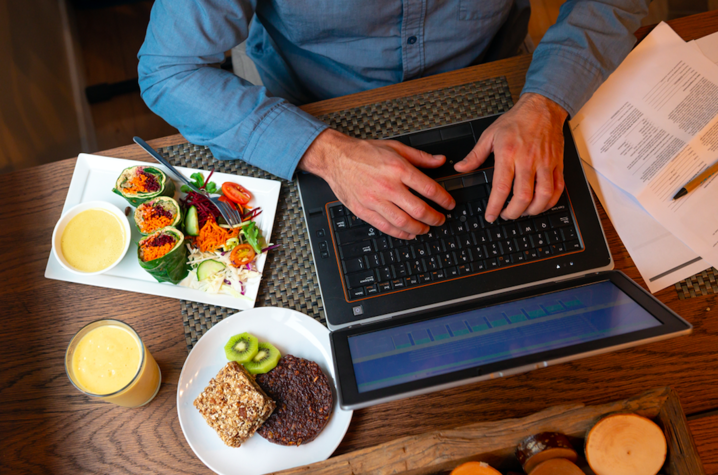Strategies for Eating Well When Working From Home

LEXINGTON, Ky. (April 21, 2020) — Working from home presents numerous challenges. You are learning to be flexible, communicate with your teams in new ways and find creative methods to meet the needs of others in the University of Kentucky community.
As you spend your days meeting these challenges, it is easy to lose sight of a basic, personal need — nutrition.
When working at home, mindless eating can be a dangerous habit. You’re on a conference call and wander into the kitchen. Suddenly, you find yourself “grazing” on snacks in the refrigerator or cabinet. Maybe you grab a handful of chips to take to your workspace that turns into several handfuls (or the whole bag). Or, you have a big project with a deadline looming and at the end of the day you realize you haven’t eaten anything!
How can you avoid turning these habits into long-term patterns?
Location, Location, Location Try to avoid setting up your workspace in or near the kitchen. You will be more tempted to walk over to the refrigerator (possibly more than once). And if you are working at the kitchen table, you will have to move your computer and supplies back and forth during meals. If you have family members, especially children, in the house, you may find yourself grabbing a snack when you are making food for them.
Also, don’t eat at your desk. You may think you are gaining a few extra minutes to work, but you are really losing focus. In fact, try to eat away from all tech — that means your phone too — to completely unplug from work.
Stick to a Schedule Keep a schedule that is like the one you had before for breakfast, lunch and dinner. When you plan your day, establish when you are going to eat meals and snacks. Set timers or alarms on your phone if necessary. And make sure you actually stop to eat. Skipping meals can affect your productivity and cause fatigue.
If you are working and homeschooling or have small children at home, you may need to eat when they eat. The important thing is that you all try to stay on a schedule. And if your children see you make healthy choices, they are more likely to do so.
Stay Hydrated Not only is water good for you (most people don’t get enough during the day), but it can prevent cravings that lead you to unhealthy snacking. It can also prevent headaches and fatigue. Keep water next to your workspace within reach and set a goal of at least 64 ounces per day.
But, be careful of the amount of caffeine you drink. Having access to an entire pot of coffee doesn’t mean you need to drink all of it. Aim for no more than two cups of coffee to avoid jitters, anxiety and digestive issues. Also, try to drink your coffee before noon so it doesn’t affect your sleep.
Be Prepared You are more likely to mindlessly graze if you don’t have any meal or snack options available. Make your meals ahead of time — something simple like overnight oats, muffin tin frittatas, salads-in-a-jar or preparations for a grain bowl. Take out the guesswork and focus on balanced, nutritious food — protein, fiber, healthy fats, fruits and veggies.
If junk food is a problem for you, eliminate the temptation. Don’t buy it! If you keep those types of foods in the house, you’re more likely to eat them just because you can, or because you are bored. Instead, keep fruit or pre-chopped vegetables and hummus handy.
These above tips don’t preclude the number one strategy: to treat yourself with compassion. “No matter what nutrition strategies you use to feed yourself and your family during these times, it is important to remember that what works better for you might look different than ‘normal,’ different than your neighbor and even different than what you did yesterday,” says Vanessa Oliver, registered dietitian with UK HR Health and Wellness. “And that's okay.”
Would you like to know more? If you want more personalized guidance on how to manage your nutrition during these challenging times, UK's Health and Wellness dietitians are available for consults online or by phone. If you have general nutrition questions or just want a dietitian to check in with you to offer support, then simply reach out to UK HR Health and Wellness at eatwelldietitians@uky.edu or Ask the RD.
In addition, the dietitians will also be conducting online presentations, like “Establishing Good Enough Choices” Tuesday, April 21, and “How to Tame Emotional Eating” Thursday, April 30. You can view other upcoming presentations here.
As the state’s flagship, land-grant institution, the University of Kentucky exists to advance the Commonwealth. We do that by preparing the next generation of leaders — placing students at the heart of everything we do — and transforming the lives of Kentuckians through education, research and creative work, service and health care. We pride ourselves on being a catalyst for breakthroughs and a force for healing, a place where ingenuity unfolds. It's all made possible by our people — visionaries, disruptors and pioneers — who make up 200 academic programs, a $476.5 million research and development enterprise and a world-class medical center, all on one campus.




